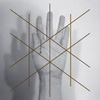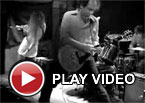John Wiese, "Seven of Wands"
 This album actually came as quite a surprise as soon as I started spinning it. I've always associated Wiese with hyper-kinetic, harsh laptop-sourced noise above all, and the seven tracks on this compilation instead show a tamer, more droning electronic sound, with the occasional bit of abstract electro-acoustic collage.
This album actually came as quite a surprise as soon as I started spinning it. I've always associated Wiese with hyper-kinetic, harsh laptop-sourced noise above all, and the seven tracks on this compilation instead show a tamer, more droning electronic sound, with the occasional bit of abstract electro-acoustic collage.
The pieces were created between 2004 and 2010, with some being sample-focused studio recordings, and others straight up live performances.What links them together is a focus less on raw dissonance, and more on sparse textures or droning electronics.
Opener "The New Dark Ages" heralds this immediately.The deep bassy rumble and tiny bits of static seem like they could open into full bore noise at any time, but instead they move at the speed of tectonic plates, blending in droning tones that never become too dominant."Burn Out," recorded live at No Fun Fest in 2006 is a similarly restrained work, slowly introducing deep, rattling tones and subtle noise.While the sound gets a bit raw later in the piece, things never get out of hand.
"Corpse Solo" and "Don't Move Your Finger" are less about the droning and more found sound/electro-acoustic improvisations.Taut, chaotic outbursts surge through both tracks, with the former drifting into slightly harsher territories, reminiscent of the Dadaist cutups of Runzelstirn & Gurgelstock.
The two long pieces that were recorded in 2010 are the culmination of the other tracks, encapsulating both jarring outbursts and tonal resonations."Scorpion Immobilization Sleeve" sounds like its built on a foundation of captured guitar feedback and erratic percussive thuds.It constantly changes forms as it goes on, picking up some of the collage-y elements and even a bit of harshness, but never going too far.
"Don't Stop Now, You're Killing Me" brings in some identifiable sounds, namely human voice and cymbal rattles, with neither used in a conventional manner.The voice (from Angus Andrew) is instead a guttural, pained death rattle that barely sounds human.While some of the other tracks have an inviting, almost mellow sound about them, here it’s purely sinister.
While I knew Wiese had expanded beyond just harsh noise, I didn't know his repertoire had become this diverse.Owing as much to the modern drone/doom world as the old school of experimental electronics, it’s a compilation that feels like a well planned, diverse album, which is no easy feat.Even people without a Merzbow record in their collection (if such people exist) can appreciate this one.
samples:
 




